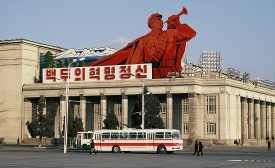media

The BBC is planning a radio service to N. Korea, and will have to navigate a landmine to do so.
Sometime in March last year Kenya’s diplomatic corps, attending the 17th Biennial Ambassadors and High Commissioners’ conference in Mombasa, bemoaned negative press reports and said this was frustrating their diplomatic initiatives in missions. The envoys noted that the local media’s fascination with “negative” narratives of insecurity, crime and corruption painted a bad image of the country abroad.
Xi Jinping is the gift that keeps on giving.[...] This past week, the government released two policies (or re-released depending on your perspective): first, no foreign entity can independently publish anything online in China, and second, all the work of the Party’s media must protect and act on behalf of the Party.

Foreign audiences are more important than ever for Hollywood...so why are we still seeing all-white casts?
Fuente Latina – a non-profit and non-governmental organization that intends to remove geographic and linguistic barriers for global Spanish language media covering stories about Israel and the Middle East – has recently open its first United States office in Miami.
The media's potential for empowering marginalized communities through public diplomacy.
Rusty Pickens, the former acting director of new media technologies at the White House, recently moved to the State Department’s International Information Programs (IIP) Bureau, where he serves as senior adviser for digital platforms. to talk about digitizing citizen engagement with the White House and how he plans to apply the lessons-learned to communicating American ideals abroad.
The closing of Al Jazeera America, expected in April, is a sad conclusion to a project that was by turns uplifting and inspiring as well as troubling and depressing. Its demise offers a lesson in both the limitations of public diplomacy and the obstacles to providing high-quality television journalism.







